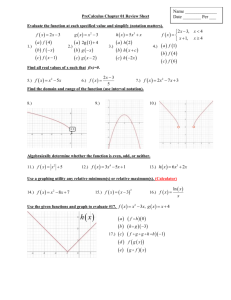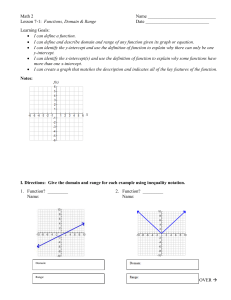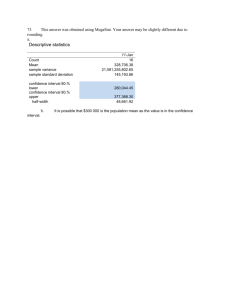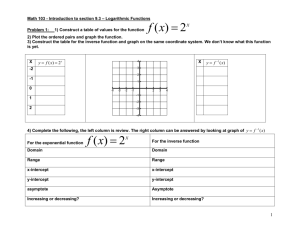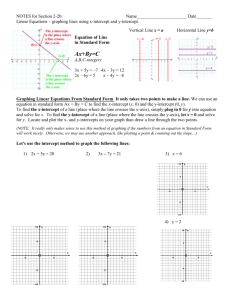AP Calculus AB Summer Assignment 2013 (final).
advertisement
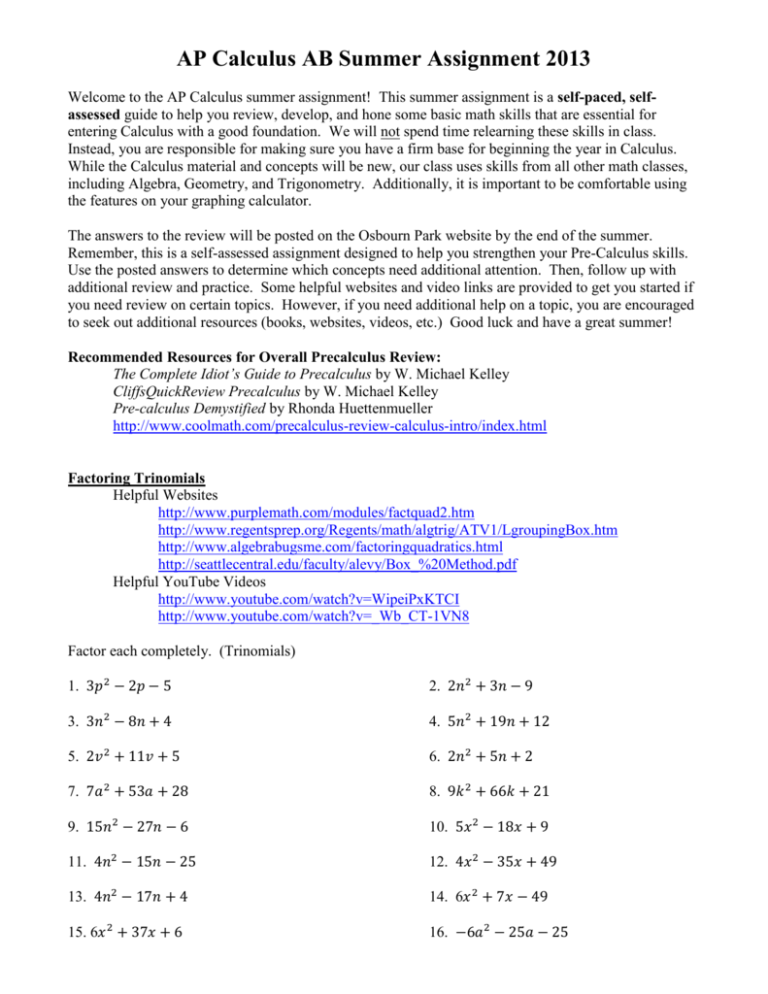
AP Calculus AB Summer Assignment 2013
Welcome to the AP Calculus summer assignment! This summer assignment is a self-paced, selfassessed guide to help you review, develop, and hone some basic math skills that are essential for
entering Calculus with a good foundation. We will not spend time relearning these skills in class.
Instead, you are responsible for making sure you have a firm base for beginning the year in Calculus.
While the Calculus material and concepts will be new, our class uses skills from all other math classes,
including Algebra, Geometry, and Trigonometry. Additionally, it is important to be comfortable using
the features on your graphing calculator.
The answers to the review will be posted on the Osbourn Park website by the end of the summer.
Remember, this is a self-assessed assignment designed to help you strengthen your Pre-Calculus skills.
Use the posted answers to determine which concepts need additional attention. Then, follow up with
additional review and practice. Some helpful websites and video links are provided to get you started if
you need review on certain topics. However, if you need additional help on a topic, you are encouraged
to seek out additional resources (books, websites, videos, etc.) Good luck and have a great summer!
Recommended Resources for Overall Precalculus Review:
The Complete Idiot’s Guide to Precalculus by W. Michael Kelley
CliffsQuickReview Precalculus by W. Michael Kelley
Pre-calculus Demystified by Rhonda Huettenmueller
http://www.coolmath.com/precalculus-review-calculus-intro/index.html
Factoring Trinomials
Helpful Websites
http://www.purplemath.com/modules/factquad2.htm
http://www.regentsprep.org/Regents/math/algtrig/ATV1/LgroupingBox.htm
http://www.algebrabugsme.com/factoringquadratics.html
http://seattlecentral.edu/faculty/alevy/Box_%20Method.pdf
Helpful YouTube Videos
http://www.youtube.com/watch?v=WipeiPxKTCI
http://www.youtube.com/watch?v=_Wb_CT-1VN8
Factor each completely. (Trinomials)
1. 3𝑝2 − 2𝑝 − 5
2. 2𝑛2 + 3𝑛 − 9
3. 3𝑛2 − 8𝑛 + 4
4. 5𝑛2 + 19𝑛 + 12
5. 2𝑣 2 + 11𝑣 + 5
6. 2𝑛2 + 5𝑛 + 2
7. 7𝑎2 + 53𝑎 + 28
8. 9𝑘 2 + 66𝑘 + 21
9. 15𝑛2 − 27𝑛 − 6
10. 5𝑥 2 − 18𝑥 + 9
11. 4𝑛2 − 15𝑛 − 25
12. 4𝑥 2 − 35𝑥 + 49
13. 4𝑛2 − 17𝑛 + 4
14. 6𝑥 2 + 7𝑥 − 49
15. 6𝑥 2 + 37𝑥 + 6
16. −6𝑎2 − 25𝑎 − 25
Factor each completely. (Difference of Two Squares)
1. 16𝑛2 − 9
2. 4𝑚2 − 25
3. 16𝑏 2 − 40𝑏 + 25
4. 4𝑥 2 − 4𝑥 + 1
5. 9𝑥 2 − 1
6. 𝑛2 − 25
7. 𝑛4 − 100
8. 𝑎4 − 9
Solving Quadratic Equations
Helpful Websites (solving by factoring)
http://www.purplemath.com/modules/solvquad.htm
http://www.regentsprep.org/Regents/math/algtrig/ATE3/quadlesson2.htm
Helpful Video (solving by factoring)
https://www.khanacademy.org/math/algebra/quadratics/quadratic_odds_ends/v/solving-aquadratic-by-factoring
Helpful Websites (solving by quadratic formula)
http://www.purplemath.com/modules/quadform.htm
http://www.regentsprep.org/Regents/math/algtrig/ATE3/quadformula.htm
Helpful Video (solving by quadratic formula)
https://www.khanacademy.org/math/trigonometry/polynomial_and_rational/quad_formul
a_tutorial/v/using-the-quadratic-formula
Solve each equation by factoring.
1. (𝑘 + 1)(𝑘 − 5) = 0
2. (𝑎 + 1)(𝑎 + 2) = 0
3. (4𝑘 + 5)(𝑘 + 1) = 0
4. (2𝑚 + 3)(4𝑚 + 3) = 0
5. 𝑥 2 − 11𝑥 + 19 = −5
6. 𝑛2 + 7𝑛 + 15 = 5
7. 𝑛2 − 10𝑛 + 22 = −2
8. 𝑛2 + 3𝑛 − 12 = 6
9. 6𝑛2 − 18𝑛 − 18 = 6
10. 7𝑟 2 − 14𝑟 = −7
Solve each equation with the quadratic formula.
1. 𝑚2 − 5𝑚 − 14 = 0
2. 𝑏 2 − 4𝑏 + 4 = 0
3. 2𝑚2 + 2𝑚 − 12 = 0
4. 2𝑥 2 − 3𝑥 − 5 = 0
5. 𝑥 2 + 4𝑥 + 3 = 0
6. 2𝑥 2 + 3𝑥 − 20 = 0
7. 4𝑏 2 + 8𝑏 + 7 = 4
8. 2𝑚2 − 7𝑚 − 13 = −10
Using the TI-83/84 Calculator
You should be comfortable with every calculator operation covered on the following website:
http://www.prenhall.com/divisions/esm/app/graphing/ti83/
Get hands-on practice by using your calculator while following through the step-by-step directions
provided. Pay special attention to how to use the following calculator operations and buttons:
Solve 𝑓(𝑥) = 0
Min/Max
Store values
Solve equation
Intersection
Zeros
Window
Table
Vars button
~~Avoiding graphing a “spike” or “phantom asymptote” on the graphing calculator.
1
f x
the graph on the calculator is often shown with a line at x 1
x 1
Use a “friendly window” or a “decimal window” ZOOM 4: ZDecimal to eliminate the
line. This will also show holes in the graph for undefined x-values.
x2 1
Ex: f x 2
x 2x 3
~~Graphing piecewise functions using the graphing calculator
3 x, x 1
f (x)
2 x, 1 x
Enter this into y1 and y2 using the symbols from the TEST menu
y1 3 x /x 1
y2 2x /1 x
2nd
MATH
We use division instead of multiplication so that the calculator will display the
different pieces of the function in connected mode without drawing extra vertical segments.
x 2,
Ex: f x 1,
x,
x 1
1 x 1
x 1
Again, enter this into y1, y2, and y3 using the symbols from the TEST menu.
You will find “and” and “or” in the LOGIC menu. To get there, hit the right arrow one
time once you are in the TEST menu.
y1 x 2 / x 1
y2 1 /x 1 and x 1
y3 x / x 1
Unit Circle
Helpful Websites
http://www.regentsprep.org/Regents/math/algtrig/ATT5/unitcircle.htm
http://www.mathsisfun.com/geometry/unit-circle.html
Helpful Videos
http://www.youtube.com/watch?v=ao4EJzNWmK8
http://www.youtube.com/watch?v=cIVpemcoAlY
By the way, we use RADIANS (and only radians) in AP Calculus AB.
Graphing
1. Graph each of the following parent functions without a calculator. Plot all relevant points on
the grid provided. Complete the information about each graph listed below.
a. y = 1
c. y = x2
y
y
x
x
Domain:
Domain:
Range:
Range:
x-intercept(s):
increasing interval(s):
y-intercept(s):
decreasing interval(s):
Name of graph:
Name of graph:
d. y = x3
b. y = x
y
y
x
x
Domain:
Domain:
Range:
Range:
x-intercept(s):
x-intercept(s):
y-intercept(s):
y-intercept(s):
increasing interval(s):
increasing interval(s):
decreasing interval(s):
decreasing interval(s):
Name of graph:
Name of graph:
x
e. y =
g. y
y
1
x
y
x
x
Domain:
Domain:
Range:
Range:
x-intercept(s):
x-intercept(s):
y-intercept(s):
y-intercept(s):
increasing interval(s):
increasing interval(s):
decreasing interval(s):
decreasing interval(s):
Name of graph:
asymptote(s):
f. y =
3
x
h. 𝑦 =
y
1
𝑥2
x
x
Domain:
Range:
x-intercept(s):
y-intercept(s):
increasing interval(s):
decreasing interval(s):
Name of graph:
y
Domain:
Range:
x-intercept(s):
y-intercept(s):
increasing interval(s):
decreasing interval(s):
asymptote(s):
i. y = 2x
j. 𝑦 = 𝑒 𝑥
y
y
x
x
Domain:
Domain:
Range:
Range:
x-intercept(s):
y-intercept(s):
increasing interval(s):
increasing interval(s):
decreasing interval(s):
decreasing interval(s):
asymptote(s):
asymptote(s):
Name of graph:
Name of graph:
k. y = lnx
𝑥
y
𝑖𝑓 𝑥 ≥ 4
2
l. 𝑔(𝑥) = {√𝑥
𝑥
2
y
𝑖𝑓 0 < 𝑥 < 4
𝑖𝑓 𝑥 < 0
x
x
Domain:
Range:
x-intercept(s):
increasing interval(s):
decreasing interval(s):
asymptote(s):
Name of graph:
g(-3) =
g(1) =
g(0) =
Is g(x) a continuous function? Explain.
2.
Graph the following equations that are transformations of one of the parent graphs from problem
a. 𝑦 = (𝑥 − 3)2 − 1
y
d. 𝑦 = 𝑒 𝑥
2
y
x
3
x
e. 𝑦 = 2−𝑥
b. 𝑦 = − √𝑥 + 4
y
y
x
x
3
f. 𝑦 = − 2√(𝑥 + 2)
c. 𝑦 = 𝑥
y
y
x
x
Geometry
1. Formulas and Units you need to know: Write the formula for each item given along with the
correct units if one length of the figure was measured in cm. You must have these memorized
for the entire school year.
Formula
Units
Perimeter of a figure
Circumference of a circle
Area of a Circle
Area of a Square
Area of a Rectangle
Area of a Trapezoid
Volume of a Prism
(nonrectangular)
Volume of a Cylinder
Volume of a Cone
Surface Area of a Prism
Surface Area of a Cylinder
Algebra
1. For each of the following sets of points, find:
the slope
the equation of the line that fits these points
a) (2, 8) (6, 0)
b) (5, 4) (10, 8)
c) (0, 4) (0, 3)
Point-Slope Form of a Line
Helpful Website
http://www.purplemath.com/modules/strtlneq2.htm
2. Expand the following expressions.
a. (8 x) 2
b. (2 x 4) 2
3. Decide whether each of the following simplifications is accurate. If not, correct the right side of
the equation to make it true.
?
2 3
5
a. 3 3 9
?
b. (3a) 4 3a 4
?
c. -24 16
d. 3x + 4y
2
e. (2 x )
f.
?
7xy
?
4x2
?
2 x 3 6x 2 2 x 2 x( x 2 3x)
?
2
g. ( x 25) ( x 5)( x 5)
2
h. ( x 2)
?
x2 4
i.
?
432 12 3
j.
x y
?
xy
k.
l.
?
x2 4 x 2
4 10 ?
2 5
2
1
m. 3 x
? 1
3x
x2 1 ?
x 1
n.
x 1
o.
2 x?
x
2
p.
a b ? a b
x
x x
q.
a ?a a
x b x b
r.
5 x 10 ? x 2
20
4
s.
2x 1 ?
1
1 2x
t.
2 4 ? 2x
3x 3 3x
x ? ax
u. a
y ay
v.
x 3 2 x 2 4 x 8 ? x 2 ( x 2) 2
x3
x2 x 6
x3 x 2 x 1 ? x 2 1
w. 4
x x3 2x 2 x3 2
x.
x
y
? x z b
w a yw a
z b
Rensselaer Polytechnic Institute has put together a booklet entitled “Ready… Set…
CALCULUS” to help incoming students prepare for Calculus classes. You can
download the booklet by visiting: http://calculus.math.rpi.edu/rsc-online-version.pdf. You may
choose to print the 63-page file or you can work from the computer screen. Not only
does this booklet include excellent problems and answers (Chapter 8), but it also provides
notes and examples as well as helpful additional websites (Chapter 7).
Please complete the following from “Ready… Set… CALCULUS”:
Read Chapter 1 Rules of the Game
Chapter 2 Arithmetic/Algebraic Operations
o 2.1 #1, 6 – 11
o 2.2 #2 – 9
**You can skip Chapter 3.**
Chapter 4 Trigonometric Functions
o 4.1 #5 – 7, 11
o 4.2 #1 – 9, 11 – 18
Chapter 5 Logarithms/Exponentials
o 5.1 #1 – 11, 13, 14
o 5.2 #1 – 4, 7 – 15, 17
Chapter 6 Graph Recognition
o 6.1 #1 – 8
Read Chapter 7 Examples and Help
Check your answers using Chapter 8 Answers
Information
Lines:
slope: m
y 2 y1
x 2 x1
equation of a line: y y1 mx x1
Binomial Expansion:
(a b) 2 (a b)(a b) a 2 2ab b 2
Graphing:
f ( x) f ( x h) is a horizontal translation to the right h units.
f ( x) f ( x) k is a vertical translation down k units.
f ( x) f ( x) is a reflection across the x-axis.
Domain is the set of possible x-values.
Range is the set of possible y-values.
PurpleMath Topics:
Beginning Algebra Topics:
Slope of a Straight Line
Midpoint Formula
Straight-line Equations
PurpleMath Topic:
Beginning Algebra Topics:
Polynomials: Multiplying
PurpleMath Topics:
Intermediate Algebra Topics:
Domain and Range
Graphing Quadratic
Equations
Piecewise Functions
Helpful Websites
http://www.purplemath.com/modules/graphing3.htm
http://www.coolmath.com/precalculus-review-calculus-intro/precalculus-algebra/07graphing-piecewise-defined-functions-01.htm
http://www.uiowa.edu/~examserv/mathmatters/tutorial_quiz/geometry/piecewisefunction
s.html
Helpful YouTube Videos
http://www.youtube.com/watch?v=-gwffMEr8i8
Vertical and Horizontal Asymptotes
Helpful Websites
http://www.purplemath.com/modules/asymtote4.htm
http://www.mathsisfun.com/algebra/asymptote.html
Helpful YouTube Videos
http://www.youtube.com/watch?v=YlEFGmfiNis
http://www.youtube.com/watch?v=iWsNUdl_zV4
Random Trig Fact:
cos 𝑥
𝑥
≠ cos

